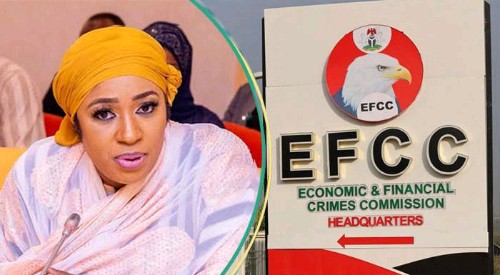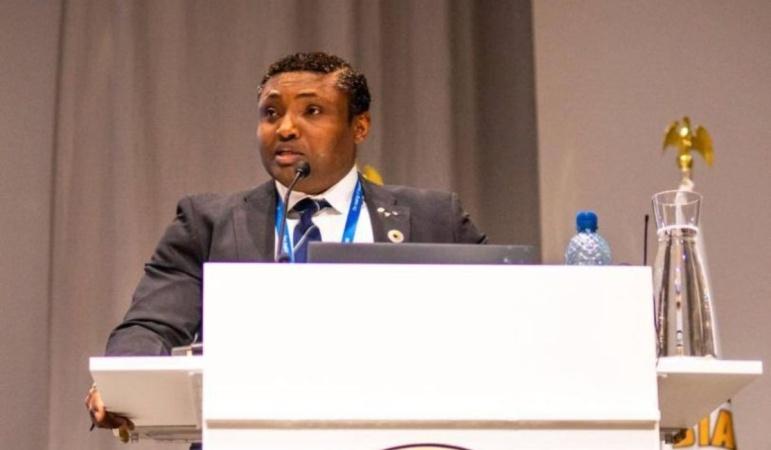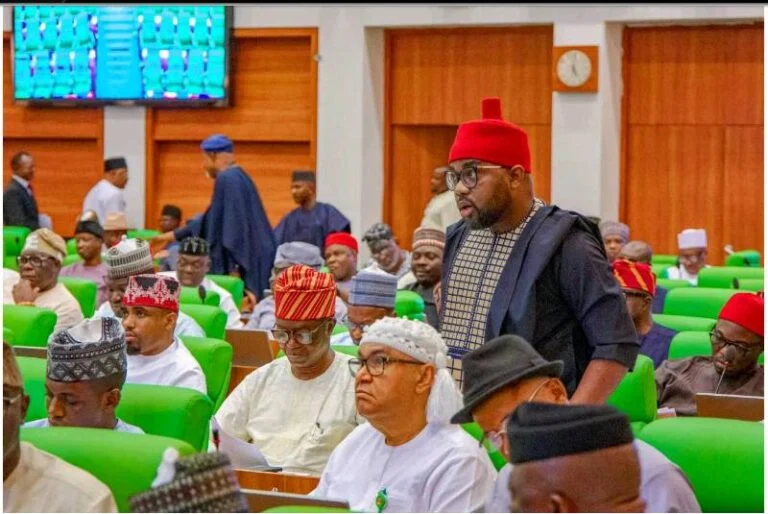The investigation into the sleaze in the Ministry of Humanitarian Affairs and Poverty Alleviation deepened on Wednesday with the Economic and Financial Crimes Commission investigators quizzing several top civil servants linked to the scandals.
It was gathered that the Independent Corrupt Practices and Other Related Offences Commission recovered N50bn from the humanitarian affairs ministry.
The money, which was about to be embezzled was recovered by the ICPC between July and August 2023 and paid into the Central Bank of Nigeria.
It was also gathered that the fund which was meant for vulnerable citizens during the tenure of former Minister Sadiya Umar-Farouq was blocked during attempts to transfer it into private bank accounts and recovered by the ICPC under its former Chairman, Bolaji Owasanoye.
An impeccable government source said that the N50bn was subsequently handed over to the President Bola Tinubu-led Federal Government.
Confirming the development, the source stated, “The funds were recovered when former President Muhammadu Buhari and Umar-Farouq were leaving office and President Tinubu had yet to appoint a new humanitarian affairs minister.
“President Tinubu, upon the appointment of the now suspended Minister of Humanitarian Affairs, Betta Edu, ordered the Accountant-General of the Federation to refund the money to the ministry as part of the Infrastructure Support Fund for the 36 states and the Federal Capital Territory to cushion the effect of the fuel subsidy removal.’’
“The refunded sum is part of the N44bn allegedly laundered in the National Social Investment Programme Agency and the N585m Edu authorised for disbursement.’’
Shedding more light on the interception and recovery of the fund, another source explained, “During the naira scarcity between late 2022 and 2023, the ICPC under Prof Owasanoye blocked and recovered the sum of N50bn from the Ministry of Humanitarian Affairs.
“The first sum that was blocked and recovered was N32bn, but when the commission probed further, another N18bn was blocked and recovered from the ministry. The ICPC discovered that the money was meant for the vulnerable and the poor people in the country which the ministry under the former minister, Umar-Farouq, could not distribute due to the scarcity of currency during the naira redesign period.
“The money was paid into the coffers of the government between July and August 2023. Some officials in the ministry attempted to disburse the funds into private accounts during the time the former minister was no longer active in office and there was no new minister last year. The ICPC immediately blocked the money after discovering the suspicious and fraudulent manner in which it was to be distributed, and it was recovered.
“After President Tinubu announced the Infrastructure Support Fund for the 36 states and the Federal Capital Territory to cushion the effect of the fuel subsidy removal, the Federal Government paid the money into the coffers of the Humanitarian Affairs Ministry under Betta Edu, being the ministry in charge poverty alleviation projects.”
In continuation of their probe, EFCC detectives Wednesday questioned many senior civil servants in the humanitarian affairs ministry.
Though the details of the officials were sketchy, our correspondent was reliably informed that they gave the investigators useful information that could them unravel the financial malfeasance in the ministry.
The investigators also held sessions with the suspended Minister of Humanitarian Affairs and Poverty Alleviation, Betta Edu, ex-minister Sadiya Umar-Farouq, and Halima Shehu, the suspended National Coordinator and CEO of the National Social Investment Programme, an agency under the humanitarian ministry.
While Edu is being investigated for authorising the transfer of N585m into the private account of an accountant in the ministry, Bridget Oniyelu, Umar-Farouq, who served as a minister under former President Muhammadu Buhari, was under the searchlight over alleged N37bn money laundering.
Shehu on the other hand was being questioned for allegedly moving N44bn NSIP funds into some private and corporate accounts without presidential approval.
An EFCC source stated, “The women came today (Wednesday) and they’re cooperating with the commission,”
“Also director-generals and other senior officials under the Ministry of Humanitarian Affairs have been and are still being interrogated by the EFCC. Senior officials of some banks are still answering questions too over the alleged money laundering.’’
Edu, who was suspended by President Bola Tinubu on Monday, had claimed that the N585m payment was meant for vulnerable groups in Akwa Ibom, Cross River, Ogun, and Lagos states.
Her Media Assistant, Rasheed Olarewaju, had claimed it was legal within the civil service for such payments to be made into private accounts of staff members, especially project accountants.
The Accountant-General of the Federation, Dr Oluwatoyin Madein, had denied that her office honoured the request to pay N585m into the private account as directed by the minister.
She said the AGF does not make payments on behalf of MDAs as they are self-accounting entities.
Meanwhile, the Peoples Democratic Party and Labour Party have charged the anti-graft agencies to widen the ongoing probe to all ministries, departments, and agencies involved in corrupt practices.
The PDP alleged that corruption was ongoing in almost all the MDAs, while the LP noted that a probe of civil servants and other ministries ‘’would bring some semblance of truthfulness into the system.’’
The Deputy National Legal Adviser of the PDP, Okechukwu Osuoha in an interview (with The Punch) explained that the civil servants in all ministries should be probed because they allegedly serve as machinery to perpetrate fraud.
He said a thorough and all-inclusive investigation would not only unveil the fraud but would help to check the activities of the civil servants in all ministries.
Osuoha stated, “Yes, the EFCC should investigate other ministries. Corruption is ongoing in other ministries and among civil servants. This did not start today. There is corruption in our system, especially in the civil service.
“The corruption is at its peak, not only in the Ministry of Humanitarian Affairs, but other ministries are also involved in corrupted practices. There are issues of embezzlement of funds and misappropriation of public funds.
“So, the government and concerned agencies should focus on them all. They should be investigated.
“Most times you will see civil servants in most ministries committing a lot of fraudulent activities. They are the most guilty because they are always there as machinery for fraud. So, the Federal Government and the anti-graft agencies need to investigate all of them.”
On his part, the PDP Deputy National Publicity Secretary, Ibrahim Abdullahi, said other ministries and civil servants should be thoroughly investigated.
He noted, “Yes, the probe should be thorough and extended to the civil servants. It would serve as deterrence against intended and corrupt Nigerians. Other ministries should be investigated too.”
Also speaking, the spokesman for the 2023 LP’s Presidential Campaign Council, Yunusa Tanko, argued that extending the probe to all MDAs would help sanitize the civil service system.
Tanko, who called for an open investigation, said, “Ministers cannot do anything alone. The civil servants are involved in the entire process. The President should extend the probe or investigation to other ministries and civil servants. That will help in sanitizing the system.
“The truth about it is that when the head has challenges of credibility, it affects all others. Why you see the unprecedented looting of treasury that is being done in different strata is because of the challenges of leadership.
‘’So, therefore when the head of the fish is rotten, it affects all others too and that is why all this looting is happening. However, extending the probe to other ministries and civil servants will bring credibility and help sanitize the system if that is the target of the government.’’
Continuing, he reasoned that an open investigation would also expose all the shenanigans in the MDAs and the individuals involved.
“This is important because all the actions in these ministries and within the civil service are interwoven in one way or the other. So, many actions of this nature cannot be taken by one person. In one way or the other, other people are involved. So, an open investigation will give a semblance of truthfulness,’’ he submitted.
Endorsing the call for extension of the ongoing probe to other MDAs, the Chairman of the Centre for Anti-Corruption and Open Leadership, Debo Adeniran, stated that the EFCC should also question the permanent secretary and other directors in the ministry, noting that they ought to have given the minister the proper orientation on public procurement.
He added that the ICPC ought to set up Anti-Corruption and Transparency desks in every ministry to verify procurement orders.
“As a matter of fact, the Permanent Secretary, the DFA (Director, Finance, and Administration), and the accounting officer in that ministry are the main people that should have been arrested and questioned because it is the permanent secretary and the directors that are supposed to give Betta Edu, the political appointee in that ministry the proper orientation on civil service procedures in procurement and financial issues.
“The ICPC is expected to have a desk in every MDA, including the Ministry of Humanitarian Affairs. The desk of the ICPC in that ministry is supposed to be called ACTU, Anti-Corruption and Transparency Unit. And every procurement transaction will pass through that ACTU desk, and the ACTU will verify whether that order complies with civil service rules or not”, he said.
On his part, the Coordinator of the African Centre for Media Information and Literacy, Chido Onumah, urged a further probe into the humanitarian affairs ministry and other MDAs, adding that the case was “a door into possible scandals in other MDAs.’’
He stated, “This is just a door into what we all know or presume to be huge corruption within ministries, departments, and agencies. I hope it provides the opportunity for this administration and the anti-graft agencies to do something.
“I mean maybe not, maybe the minister knew what it was they were doing. But the point I’m trying to make is that there is a serious institutional failure here, a serious lack of procedure.
“So the permanent secretary is the accounting officer more or less, and I think he or she should be the one originating memos before bringing it to the minister after it must have gone through some procedures.
“So, whether it is the person that sent the memo directly to the minister, or the perm sec, there should be more questions to ask, as to what transpired.”
Meanwhile, the Permanent Secretary of the Ministry of Humanitarian Affairs and Poverty Alleviation, Abel Enitan, has taken over affairs at the ministry following the suspension of the minister, Edu.
The minister was suspended by President Bola Ahmed Tinubu on Monday over the alleged payment of N585 million into a private account.
She had been directed to hand over to the permanent secretary and to fully cooperate with the investigating authorities as they conducted their investigation.
Enitan assumed responsibility after reportedly receiving a letter from the office of the Secretary to the Government of the Federation on Monday night.
Credit: The Punch

 BIG STORY3 days ago
BIG STORY3 days ago
 BIG STORY3 days ago
BIG STORY3 days ago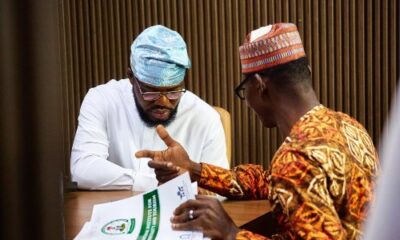
 BIG STORY3 days ago
BIG STORY3 days ago
 BIG STORY2 days ago
BIG STORY2 days ago
 BIG STORY4 days ago
BIG STORY4 days ago
 BIG STORY3 days ago
BIG STORY3 days ago
 BIG STORY4 days ago
BIG STORY4 days ago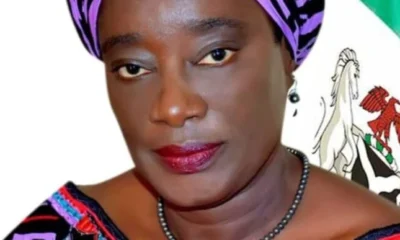
 BIG STORY4 days ago
BIG STORY4 days ago




